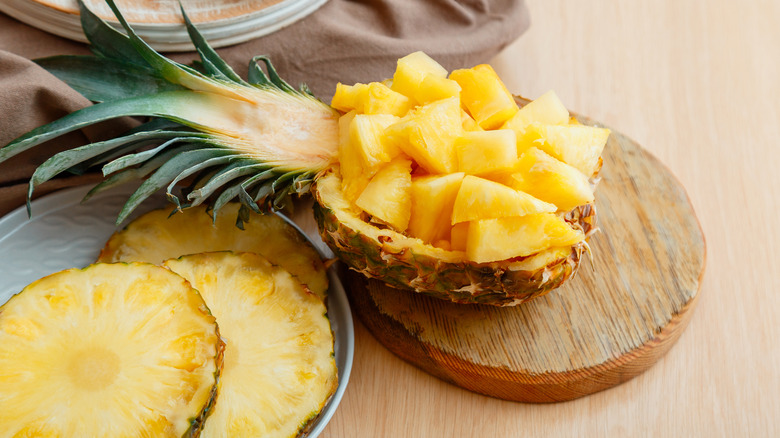The Unexpected Way Salt Affects The Taste Of Pineapple
Not all fruits are created equal, and some have quirky characteristics that seemingly defy logic. For example, why would a pineapple tingle your tongue or create an itch that's impossible to scratch? If you're one of many humans reporting this perplexing pineapple malady, don't worry. There's an answer for why it happens and a simple solution that lets you enjoy this healthy and delicious earth-offering all summer long.
Botanically known as Ananas comosus, per ScienceDirect, the pineapple packs a punch of health-enhancing vitamins C and B6, manganese, potassium, riboflavin, iron, and more, according to WebMD. It also harbors healthy amounts of bromelain, a digestive enzyme that helps relieve pain and reduce inflammation. But that bromelain is where the issues dwell. Taste of Home explains that bromelain causes that tingling tongue sensation, primarily because it breaks down other proteins while it's active in your mouth.
A simple solution, touted as either an old-wives-tale or innovative natural solution, is salt. Here's a look at how that works.
Salting a pineapple makes it seem sweeter
Salt triggers bromelain, so adding it to fresh pineapple deactivates the enzyme before you eat it, explains Eating Well. By the time the pre-salted pineapple reaches your taste buds, the bromelain is neutralized and no longer fights to break down other proteins. Not fond of salty fruit? I'm sure you're not alone. But Eating Well reports that salt actually balances sweetness and acidity, and that a small amount of salt can intensify sweetness, per Mary Ellen Camire, Ph.D., a food science and human nutrition professor at the University of Maine Orono. The trick is to avoid an overwhelming salty flavor.
The easiest way to do that is to give pineapple slices or chunks a quick dip in a salt-and-water solution. Eating Well recommends using one teaspoon kosher salt to one cup water and soaking it for one minute. Taste of Home suggests an alternative method of cutting the fruit from the spiral and rubbing salt directly onto each section, then rinsing well. Lifehacker notes that the pineapple core contains the heaviest concentrations of bromelain, so always remove it before cutting and spreading the enzyme.
Finally, heat deactivates bromelain. So, if you just can't wrap your head around salted pineapple, try it roasted or grilled, suggests Bon Appétit. Eating fresh pineapple with creamy dairy products can also help by neutralizing the pH and providing another protein for the enzymes to attack.

